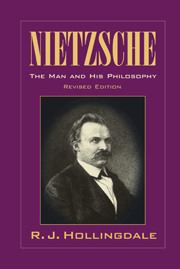Book contents
- Frontmatter
- Contents
- Preface to the Revised Edition
- A List of Nietzsche's Works
- Part I 1844-1869
- Part II 1869-1879
- 4 The Professor
- 5 Wagner, Schopenhauer, Darwin and the Greeks
- 6 Basel and Bayreuth
- 7 Sorrento and an End in Basel
- Part III 1879-1889
- PART IV 1889-1900
- Postscript 1999
- Selective Bibliography
- Index
6 - Basel and Bayreuth
from Part II - 1869-1879
Published online by Cambridge University Press: 13 September 2019
- Frontmatter
- Contents
- Preface to the Revised Edition
- A List of Nietzsche's Works
- Part I 1844-1869
- Part II 1869-1879
- 4 The Professor
- 5 Wagner, Schopenhauer, Darwin and the Greeks
- 6 Basel and Bayreuth
- 7 Sorrento and an End in Basel
- Part III 1879-1889
- PART IV 1889-1900
- Postscript 1999
- Selective Bibliography
- Index
Summary
Wagner was merely one of my illnesses. Not that I should wish to be ungrateful to this illness … the philosopher is not free to dispense with Wagner … I would understand what a philosopher meant who declared: 'Wagner summarises modernity. There is nothing for it, one must first be a Wagnerian.’ (W Vorwort)
In his summing-up of Nietzsche's mental history, Kurt Hildebrandt concludes that between 1873 and 1880 he ‘passed through a period of neurosis, the fundamental cause of which was a psychical conflict’, and the climactic point of which was reached in 1879. The course of his inner life during the earlier part of this period, which came to a muffled climax with his flight from and return to Bayreuth in 1876, constitutes an almost perfect mechanism for the production of neurosis: increasing tension between his desire for independence and the feeling of subservience to Wagner; conflict between the world of 'free-thought’ into which he was moving and the Teutonic-mystic ‘Bayreuth idea’; emotional frustration coinciding with the marriage of his closest friends; ever-present ill-health the existence of which provided a retreat and ‘excuse’ for indecision. Nietzsche later characterized the ‘decadent’ as one who desires what harms him; we should, in this case, speak of the ‘neurotic', and a sign that Nietzsche was becoming neurotic during the mid-1870s is that his emotional inclination was all towards what he knew intellectually he should be giving up: hence the dichotomy between his private opinions on Wagner and Bayreuth and those expressed in his published works. He could see that the ‘ideological’ side to Wagner, which had been subordinate while he was the lonely artist in his Tribschen retreat, had come more and more to the fore after he had gone to Bayreuth, and that with this ideology he would sooner or later have to break; but when he saw Wagner at work, heard his voice and his music, associated with his family and his collaborators, or listened to attacks upon him from men who were unworthy to fasten his shoes, his old love for the man and his mission reasserted itself with irresistible force. At such times the idea of deserting him seemed unthinkable; yet it continued to be thought.
- Type
- Chapter
- Information
- NietzscheThe Man and His Philosophy Revised Edition, pp. 86 - 106Publisher: Cambridge University PressPrint publication year: 1999



